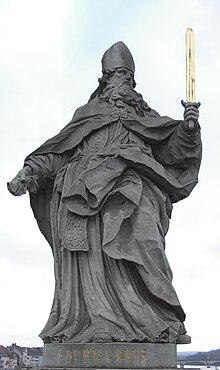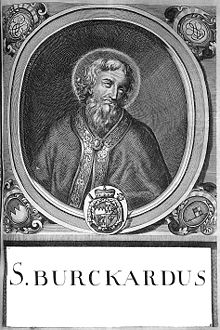Burkard


Burkard or Burchard , also Burkhard , Latin Burchardus / Burckardus and Old English Burgheard (* 683 ; † 755 in Homburg am Main ), was an Anglo-Saxon Benedictine from south-west England who was appointed first bishop of Würzburg by his compatriot Bonifatius in 742 (742 to 754).
Life
Like Bonifatius, Burkard (Burkhard) was of distinguished origin. His home was probably the western south of England. Like Boniface, he too was a Benedictine .
The Anglo-Saxon Burkard, born around 683 to 685, was probably ordained a priest by Boniface when he was 30 and moved to the mainland to do missionary work around 715 or shortly afterwards.
From 738 Burkard was probably 1st abbot in the monastery cell Rorlach , today's Neustadt am Main .
Appointed by Papal mandate by Boniface, he was the first bishop of Würzburg from the beginning of 742 to 754. According to the chronicle of Lorenz Fries, he is said to have been in Neustadt the first time as a bishop.
He attended the synods from 742 to 747 (Imperial Assembly and Synod in Düren 747). On behalf of Pippin the Younger , he traveled to Rome together with Abbot Fulrad of Saint Denis near Paris 750/751. There he got permission from Pope Zacharias to depose the last Merovingian - Childeric III. - a.
In his diocese, Burkard, whose cathedral was initially the Marienkirche located on the Marienberg (today in the Marienberg Fortress ), was primarily concerned with its expansion, as the Franks tended to become pagan again despite the missionary work by Kilian and his companions Kolonat and Totnan . In 750 Burkard founded the Sankt Andreas monastery in Würzburg , which was later renamed Sankt Burkard.
According to tradition, he resigned his offices in the spring of 754 and became a hermit near Homburg am Main, where he died the following year in 755. His bones were transferred on October 11, 988 to the Würzburg monastery, Andreaskloster , which he founded in 750 .
Adoration
In the Middle Ages, the festival of St. Burkard was celebrated in the Diocese of Würzburg like the other high festivals. The Burkardusweck , bread in the shape of a ring, was a popular custom. Saint Burkard is venerated by the faithful as a helper against joint pain and rheumatism, as well as stone and kidney ailments and loin pain. The Protestant and Roman Catholic feast day of the saint is February 2nd ; the elevation of his bones is celebrated by the Roman Catholic Church on October 14th. The (New) Burkarderschule founded in 1881 (now merged with the Steinbachtal-Burkarder Elementary School) was named after him.
Patronage
Germany:
- Marienkapelle (Bad Kissingen)
- Burkard Church (Burkersdorf)
- St. Burkhard (Eliasbrunn)
- St. Burkard (Geiselwind)
- St. Burkhard (Hohenfelden)
- St. Burkard (Hardheim)
- St. Burkhard (Messelhausen)
- St. Burkard (Oberailsfeld, Ahorntal municipality)
- St. Burkard (Obernbreit)
- St. Burchard (Oedingen)
- St. Burkard (Oerlenbach)
- St. Burkhard (Uiffingen)
- St. Burkard (Würzburg)
Switzerland:
swell
- Vita Burkardi 1 and 2
- Chronicle of Lorenz Fries
literature
- Friedrich Wilhelm Bautz : Burchard. In: Biographisch-Bibliographisches Kirchenlexikon (BBKL). Volume 1, Bautz, Hamm 1975. 2nd, unchanged edition Hamm 1990, ISBN 3-88309-013-1 , Sp. 816-817.
- Wilhelm Engel : Burchard. In: New German Biography (NDB). Volume 3, Duncker & Humblot, Berlin 1957, ISBN 3-428-00184-2 , p. 29 ( digitized version ).
- Heinrich Hahn : Burghard . In: Allgemeine Deutsche Biographie (ADB). Volume 3, Duncker & Humblot, Leipzig 1876, pp. 564-566.
- Konrad Schäfer, Heinrich Schießer: Life and Work of St. Burkhard (= Bad Neustädter contributions to the history and local history of Franconia. Volume 4). Bad Neustadt ad Saale 1986, ISBN 978-3-9800482-4-8 .
- Heinrich Wagner : Würzburger Diözesan Geschichtsblätter (WDGB). Volume 65, 2003 (Die Würzburger Bischöfe 741-842), pp. 17-43.
- Alfred Wendehorst : Burchard (No. 14) . In: Lexicon of the Middle Ages (LexMA). Volume 2, Artemis & Winkler, Munich / Zurich 1983, ISBN 3-7608-8902-6 , Sp. 951.
- Klaus Weyer: From the Celtic shrine to the Carolingian mission monastery - Neustadt am Main. Königshausen & Neumann, Würzburg 2019, pp. 37–125, ISBN 978-3-8260-6740-2 .
Web links
- http://www.weyer-neustadt.de/content/DesktopDefault.aspx?tabid=180
- Burkard in the Frieschen Chronicle
- Biography “St. Burchard of Würzburg "(English)
- Burkard in the personal register of the Germania Sacra online
Remarks
- ↑ 753 is also given as the year of his death - compare Friedrich Wilhelm Bautz: BURCHARD, first bishop of Würzburg. In: Biographisch-Bibliographisches Kirchenlexikon (BBKL). Volume 1, Bautz, Hamm 1975. 2nd, unchanged edition Hamm 1990, ISBN 3-88309-013-1 , Sp. 816-817.
- ^ Wilhelm Engel in: Willy Schmitt-Lieb, Wilhelm Engel: Würzburg in the picture. With a foreword by Mayor Franz Stadelmayer . Wisli-Mappe, Würzburg 1956, p. 9.
- ^ Horst-Günter Wagner : The urban development of Würzburg 1814-2000. In: Ulrich Wagner (Hrsg.): History of the city of Würzburg. 4 volumes, Volume I-III / 2, Theiss, Stuttgart 2001-2007; III / 1–2: From the transition to Bavaria to the 21st century. Volume 2, 2007, ISBN 978-3-8062-1478-9 , p. 1300, note 64.
- ^ Harm-Hinrich Brandt : Würzburg municipal policy 1869-1918. In: Ulrich Wagner (Hrsg.): History of the city of Würzburg. 4 volumes; Volume III / 1–2: From the transition to Bavaria to the 21st century. Theiss, Stuttgart 2007, ISBN 978-3-8062-1478-9 ), pp. 64-166 and 1254-1267; here: p. 138 ( New Burkard School ).
- ↑ website .
| predecessor | Office | successor |
|---|---|---|
| --- |
Bishop of Würzburg 742–754 |
Megingaud |
| personal data | |
|---|---|
| SURNAME | Burkard |
| ALTERNATIVE NAMES | Burchard; Burgheard |
| BRIEF DESCRIPTION | Bishop, saint |
| DATE OF BIRTH | 683 |
| PLACE OF BIRTH | South West England |
| DATE OF DEATH | 755 |
| Place of death | Homburg am Main |

